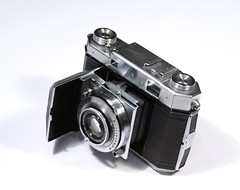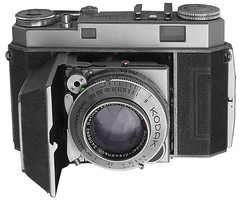Difference between revisions of "Kodak Retina IIa"
m (clarity edit) |
m (→Links) |
||
| (38 intermediate revisions by 20 users not shown) | |||
| Line 1: | Line 1: | ||
| − | The Kodak Retina IIa ( | + | {{Flickr_image |
| + | |image_source= http://www.flickr.com/photos/thewrongdevice/4612503071/in/pool-camerawiki | ||
| + | |image= http://farm5.static.flickr.com/4069/4612503071_ff3d36b089_m.jpg | ||
| + | |image_align= right | ||
| + | |image_text= 1939 Type 150 Retina IIa | ||
| + | |image_by= Laszlo Gerencser | ||
| + | |image_rights= with permission | ||
| + | }} | ||
| + | |||
| + | |||
| + | The '''Kodak Retina IIa''' is a [[rangefinder (device)|rangefinder-focusing]], [[folding]] [[35mm]] camera made by [[Kodak AG]], the German subsidiary of [[Kodak]]. | ||
| + | |||
| + | ==Production History== | ||
| + | |||
| + | The designation Retina IIa can refer to two different camera production runs, separated by a gap of 10 years. For clarity, Retina collectors and historians refer to Retina models by a factory Type number given before the camera name. | ||
| + | |||
| + | ===Pre-WWII model=== | ||
| + | The pre-WWII '''Type 150''' Retina IIa is a redesign of the preceding Type 142 Retina II. This reshaped the top plate, combined the [[rangefinder (device)|rangefinder]] and viewfinder into one eyepiece, and moved the frame counter next to the wind knob. There is a depth-of-field scale wheel on the camera's bottom. | ||
| + | |||
| + | The Type 150 Retina IIa was manufactured from 1939 to 1941. Three lenses were offered, ranging from an f/3.5 Ektar to a f/2.0 Retina-Xenon; all are in [[Compur-Rapid]] shutters. | ||
| + | |||
| + | The War-time German government ordered a stop to all camera production at Kodak A.G. in the summer of 1941. | ||
| + | |||
| + | |||
| + | ===Post-WWII models=== | ||
| + | When production resumed in 1949, the new '''Type 011''' was not much changed from the prewar model. The top plate is slightly lower, and there are no strap lugs. Ektar, [[Rodenstock]] Heligon, or Retina-Xenon lenses were offered, all f/2.0, in Compur-Rapid shutters. | ||
{{Flickr_image | {{Flickr_image | ||
| − | |image_source= http://www.flickr.com/photos/alf_sigaro/312918844/in/pool- | + | |image_source= http://www.flickr.com/photos/alf_sigaro/312918844/in/pool-camerawiki |
| − | |image= http://farm1.static.flickr.com/100/ | + | |image= http://farm1.static.flickr.com/100/312918844_909d69c3ca_m.jpg |
| − | |image_align= | + | |image_align= right |
| − | |image_text= | + | |image_text= Late production Type 016 Retina IIa<br /><small>Picture by [http://www.flickr.com/photos/alf_sigaro/ Alf Sigaro] {{creative commons}}</small> |
}} | }} | ||
| − | + | Serial numbers prefixed with '''EK''' indicate cameras exported for sale in the US. | |
| − | |||
| − | However the IIa had not yet succumbed to the feature creep of built-in metering and interchangeable front lens elements, which necessitated the larger, plumper body style of the post-1954 Retina models. | + | ===Rapid-wind models=== |
| + | The '''Type 016''' Retina IIa was manufactured from January 1951 to April 1954. This version of the IIa broke with all prior Retina II versions, in adding a [[film advance|rapid-wind lever]]. This also cocks the shutter, whether the camera front is open or closed. Adding this feature to the already-established folding body required a complex linkage, which is vulnerable to rough handling (although later folding Retinas are even worse). | ||
| + | |||
| + | Cameras made from January to March 1951 have Compur-Rapid shutters; ones made after this up to the end of production in April 1954 have a Synchro-Compur. 50mm f/2.0 Retina-Heligon and Retina-Xenon lenses were offered. | ||
| + | |||
| + | Serial numbers prefixed with '''EK''' indicate cameras exported for sale in the US. | ||
| + | {{br}} | ||
| + | |||
| + | ==The Retina IIa as a 'User' camera== | ||
| + | Classic-camera aficionados such as Stephen Gandy have suggested that the IIa may represent the "sweet spot" of the entire Retina series: <ref>[http://www.cameraquest.com/retIIa.htm Kodak Retina IIa] at [http://www.cameraquest.com/classics.htm Cameraquest.com]</ref> The IIa had been modernized to include [[rangefinder (device)|rangefinder]] focus, excellent-quality f/2.0 lenses from [[Schneider]] and [[Rodenstock]], and rapid advance, in a compact package scarcely larger than the original 1934 Retina. | ||
| + | |||
| + | However the IIa had not yet succumbed to the 'feature creep' of built-in metering and interchangeable front lens elements, which necessitated the larger, plumper body style of the post-1954 Retina models. | ||
On the negative side, the viewfinder of the IIa is not especially large or bright; and the shutter speed sequence was not yet the standard geometric series adopted by camera makers in the late 1950s. However the coated 50mm f/2.0 Retina-Xenon lens remains a credible performer even by modern standards. | On the negative side, the viewfinder of the IIa is not especially large or bright; and the shutter speed sequence was not yet the standard geometric series adopted by camera makers in the late 1950s. However the coated 50mm f/2.0 Retina-Xenon lens remains a credible performer even by modern standards. | ||
| − | |||
{{br}} | {{br}} | ||
| Line 23: | Line 57: | ||
== Links == | == Links == | ||
In English: | In English: | ||
| + | * [http://www.hsrcjournals.org/ Historical Society for Retina Cameras] | ||
* [http://www.cameraquest.com/retIIa.htm Kodak Retina IIa] at [http://www.cameraquest.com/classics.htm Cameraquest.com] | * [http://www.cameraquest.com/retIIa.htm Kodak Retina IIa] at [http://www.cameraquest.com/classics.htm Cameraquest.com] | ||
* [http://www.photoethnography.com/ClassicCameras/KodakRetina.html Kodak Retina Series] at [http://www.photoethnography.com/equipment.html Karen Nakamura's Photoethnography.com] | * [http://www.photoethnography.com/ClassicCameras/KodakRetina.html Kodak Retina Series] at [http://www.photoethnography.com/equipment.html Karen Nakamura's Photoethnography.com] | ||
| − | |||
* [http://www.dantestella.com/technical/retina.html Kodak Retina II/IIa/IIc] compared by [http://www.dantestella.com/technical.html Dante Stella] | * [http://www.dantestella.com/technical/retina.html Kodak Retina II/IIa/IIc] compared by [http://www.dantestella.com/technical.html Dante Stella] | ||
| − | * [http://www. | + | * [https://www.butkus.org/chinon/kodak/kodak_retina_iia/kodak_retina_iia.htm Retina IIa manual] at [http://www.orphancameras.com Mike Butkus Orphan Cameras] |
| + | * [http://thecameracollection.tumblr.com/post/614153437/kodak-retina-iia Retina IIa Type 150] | ||
| + | * [http://www.luistriguez.es/fotos/cameras/kodak_retina_iia/index_retinaiia.htm Retina IIa Type 016] by luis triguez | ||
| + | |||
| + | |||
| + | |||
| + | |||
| − | [[Category:Kodak AG]] | + | [[Category:Kodak AG|Retina 2a]] |
[[Category:German 35mm rangefinder folding]] | [[Category:German 35mm rangefinder folding]] | ||
| + | [[Category: R|Retina IIa]] | ||
| + | [[Category: Retina]] | ||
| + | [[Category:1939]] | ||
Latest revision as of 02:33, 21 March 2019

|
| 1939 Type 150 Retina IIa image by Laszlo Gerencser (Image rights) |
The Kodak Retina IIa is a rangefinder-focusing, folding 35mm camera made by Kodak AG, the German subsidiary of Kodak.
Contents
Production History
The designation Retina IIa can refer to two different camera production runs, separated by a gap of 10 years. For clarity, Retina collectors and historians refer to Retina models by a factory Type number given before the camera name.
Pre-WWII model
The pre-WWII Type 150 Retina IIa is a redesign of the preceding Type 142 Retina II. This reshaped the top plate, combined the rangefinder and viewfinder into one eyepiece, and moved the frame counter next to the wind knob. There is a depth-of-field scale wheel on the camera's bottom.
The Type 150 Retina IIa was manufactured from 1939 to 1941. Three lenses were offered, ranging from an f/3.5 Ektar to a f/2.0 Retina-Xenon; all are in Compur-Rapid shutters.
The War-time German government ordered a stop to all camera production at Kodak A.G. in the summer of 1941.
Post-WWII models
When production resumed in 1949, the new Type 011 was not much changed from the prewar model. The top plate is slightly lower, and there are no strap lugs. Ektar, Rodenstock Heligon, or Retina-Xenon lenses were offered, all f/2.0, in Compur-Rapid shutters.

|
| Late production Type 016 Retina IIa Picture by Alf Sigaro (Image rights) |
Serial numbers prefixed with EK indicate cameras exported for sale in the US.
Rapid-wind models
The Type 016 Retina IIa was manufactured from January 1951 to April 1954. This version of the IIa broke with all prior Retina II versions, in adding a rapid-wind lever. This also cocks the shutter, whether the camera front is open or closed. Adding this feature to the already-established folding body required a complex linkage, which is vulnerable to rough handling (although later folding Retinas are even worse).
Cameras made from January to March 1951 have Compur-Rapid shutters; ones made after this up to the end of production in April 1954 have a Synchro-Compur. 50mm f/2.0 Retina-Heligon and Retina-Xenon lenses were offered.
Serial numbers prefixed with EK indicate cameras exported for sale in the US.
The Retina IIa as a 'User' camera
Classic-camera aficionados such as Stephen Gandy have suggested that the IIa may represent the "sweet spot" of the entire Retina series: [1] The IIa had been modernized to include rangefinder focus, excellent-quality f/2.0 lenses from Schneider and Rodenstock, and rapid advance, in a compact package scarcely larger than the original 1934 Retina.
However the IIa had not yet succumbed to the 'feature creep' of built-in metering and interchangeable front lens elements, which necessitated the larger, plumper body style of the post-1954 Retina models.
On the negative side, the viewfinder of the IIa is not especially large or bright; and the shutter speed sequence was not yet the standard geometric series adopted by camera makers in the late 1950s. However the coated 50mm f/2.0 Retina-Xenon lens remains a credible performer even by modern standards.
Notes
Links
In English: